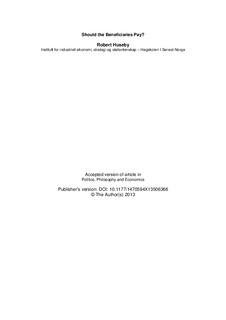| dc.contributor.author | Huseby, Robert | |
| dc.date.accessioned | 2018-01-08T13:41:46Z | |
| dc.date.available | 2018-01-08T13:41:46Z | |
| dc.date.created | 2015-12-14T10:55:26Z | |
| dc.date.issued | 2015 | |
| dc.identifier.citation | Politics, Philosophy and Economics. 2015, 14 (2), 209-225. | nb_NO |
| dc.identifier.issn | 1470-594X | |
| dc.identifier.uri | http://hdl.handle.net/11250/2476285 | |
| dc.description.abstract | Many theorists claim that if an agent benefits from an action that harms others, that agent has a moral duty to compensate those who are harmed, even if the agent did not cause the harm herself. In the debate on climate justice, this idea is commonly referred to as the beneficiary-pays principle (BPP). This paper argues that the BPP is implausible, both in the context of climate change and as a normative principle more generally. It should therefore be rejected. | nb_NO |
| dc.language.iso | eng | nb_NO |
| dc.title | Should the beneficiaries pay? | nb_NO |
| dc.type | Journal article | nb_NO |
| dc.type | Peer reviewed | nb_NO |
| dc.description.version | acceptedVersion | nb_NO |
| dc.source.pagenumber | 209-225 | nb_NO |
| dc.source.volume | 14 | nb_NO |
| dc.source.journal | Politics, Philosophy and Economics | nb_NO |
| dc.source.issue | 2 | nb_NO |
| dc.identifier.doi | 10.1177/1470594X13506366 | |
| dc.identifier.cristin | 1300202 | |
| dc.relation.project | Norges forskningsråd: 185362 | nb_NO |
| dc.relation.project | Norges forskningsråd: 222541 | nb_NO |
| cristin.unitcode | 222,57,2,0 | |
| cristin.unitname | Institutt for industriell økonomi, strategi og statsvitenskap | |
| cristin.ispublished | true | |
| cristin.fulltext | original | |
| cristin.qualitycode | 1 | |
